Did you know bodybuilding is more than 50% about nutrition? This fact shows how important a balanced diet is for building lean muscle and strength. A diet high in protein is key for muscle growth. Athletes need about 1.5 grams of protein per pound of body weight each day.
A good fitness diet also includes complex carbs and healthy fats. These provide energy and help muscles work well.
To build muscle, eat 20 calories per pound of body weight daily. Focus on quality protein and carbs. Drinking plenty of water is also crucial. It helps move nutrients to muscles and gets rid of waste.
By following a good muscle nutrition plan, you can reach your strength training goals. You’ll get a strong, lean body with the right nutrition, regular training, and enough rest.
Key Takeaways
- A well-balanced diet is essential for building muscle, with a focus on high-protein foods and complex carbohydrates.
- Athletes require approximately 1.5 grams of protein per pound of body weight per day for optimal muscle growth.
- Healthy fats, such as omega-3 fatty acids, are important for supporting muscle function and providing energy.
- Staying hydrated is crucial for transporting nutrients to the muscles and removing waste products.
- A strategic approach to calorie intake, including a daily calorie surplus of 300-500 calories, can support muscle rebuilding and growth after workouts.
- Resistance training with weights and proper nutrition are the primary means for building muscle and achieving strength training goals.
- Calculating daily calorie needs based on resting metabolic rate, physical activity, and weightlifting routine is necessary for optimal muscle growth.
Understanding Muscle Nutrition Basics
Nutrition is key for building muscle. A diet rich in protein, like lean meats and fish, helps muscles repair and grow. Amino acids, like leucine, boost muscle protein synthesis. Vitamins and minerals also support muscle function and health.
After working out, eating carbs and protein helps with energy and muscle recovery. Whey protein is great for this because it’s high in protein and boosts muscle growth. Creatine is also good for muscle growth, as it increases strength and endurance.
Some important muscle nutrition tips include:
- Eat enough protein, about 1.2-1.5g per kilogram of body weight, to support muscle growth.
- Include complex carbs in your diet for workout energy.
- Stay hydrated to help muscles function and keep overall health.
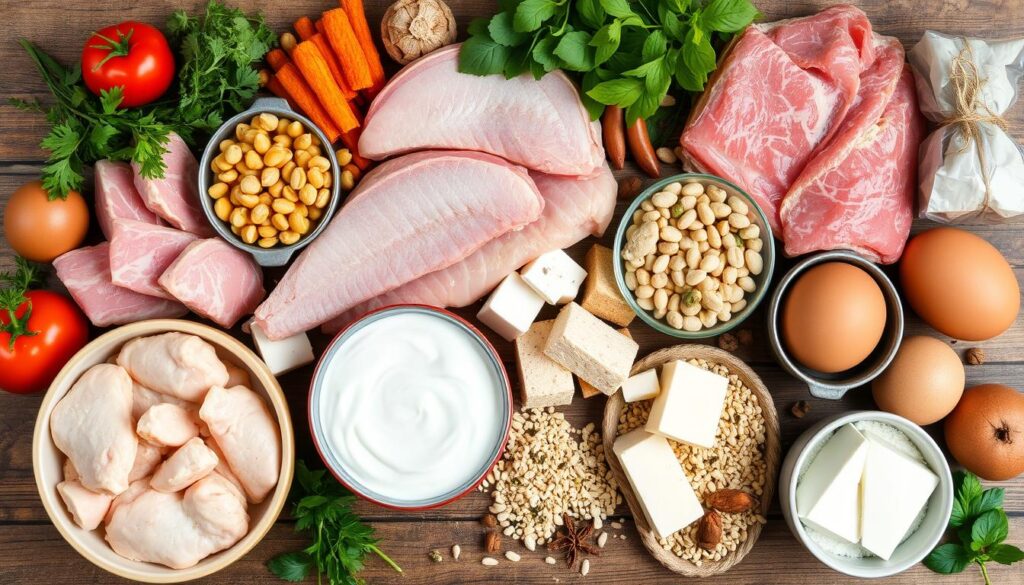
To support muscle growth and health, understand muscle nutrition basics. Include protein-rich foods, amino acids, and other essential nutrients in your diet. Also, make sure you’re getting enough calories to support muscle gain.
| Nutrient | Recommended Intake |
|---|---|
| Protein | 1.2-1.5g per kilogram of body weight |
| Carbohydrates | 2-3g per kilogram of body weight |
| Healthy Fats | 0.5-1g per kilogram of body weight |
Proteins: The Building Blocks of Muscle
Building lean muscle needs a good fitness diet. Strength training is key, and you need enough protein to grow and repair muscles. Protein shakes and snacks are great for busy people to get more protein.
Eating lean meats, fish, eggs, and dairy helps a lot. It’s also smart to eat protein after working out to help muscles recover. The Academy of Nutrition and Dietetics says you should eat 0.8 grams of protein per kilogram or 0.35 grams per pound of body weight daily for health.
Best Sources of Protein
- Lean meats, such as chicken and turkey
- Fish, such as salmon and tuna
- Eggs and dairy products, such as milk and Greek yogurt
- Legumes, such as beans and lentils
Muscle growth happens when you build more muscle protein than you break down. This is done by lifting weights and eating enough protein. People who lift weights or train for events should eat 1.2-1.7 grams of protein per kilogram of body weight daily.
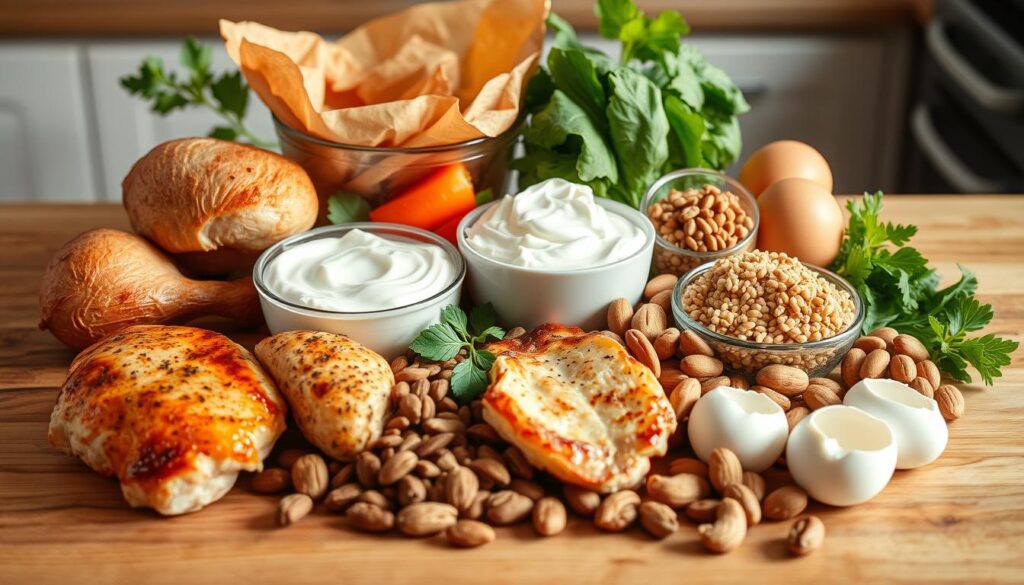
Timing Your Protein Intake
Eating protein before working out can help your body composition and increase energy use for up to 48 hours after. But eating protein after working out is even better for growing muscles and recovery.
The Role of Carbohydrates in Muscle Growth
Carbohydrates are key for energy during workouts and muscle support. Eating complex carbs like whole grains and fruits is good for health and fitness. They give long-lasting energy and help muscles work well, making them key for building muscle.
Carbs are also important for muscle recovery after exercise. Eating complex carbs before and after workouts helps muscles heal and grow. A diet rich in carbs, protein, and healthy fats supports overall health and fitness. Knowing when to eat carbs is also crucial for muscle growth.
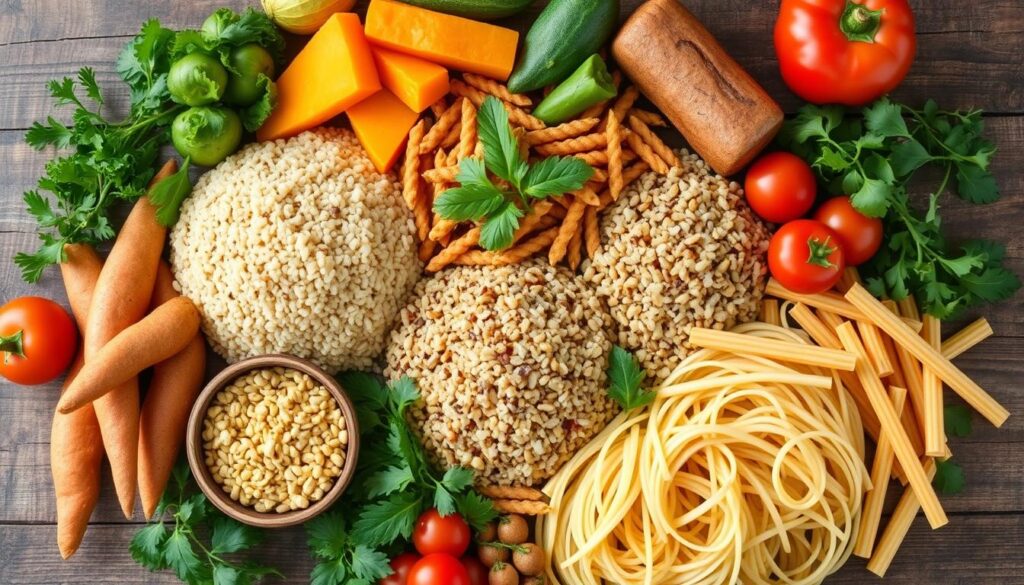
- Whole grains, such as brown rice and quinoa
- Fruits, such as bananas and apples
- Vegetables, such as sweet potatoes and broccoli
These foods give lasting energy and support muscles, making them great for a muscle-building diet. Adding complex carbs to your diet and knowing when to eat them helps with muscle growth and recovery.
A diet that includes complex carbs, protein, and healthy fats supports health and fitness. Eating whole, unprocessed foods and understanding nutrient timing helps maximize carb benefits for muscle growth and recovery. This supports a balanced diet.
Healthy Fats: Fueling Your Workouts
Healthy fats are key for fueling workouts. They support muscle function and overall health. Eating the right fats, like omega-3s, can cut down on inflammation and aid in muscle recovery. Studies show that athletes should aim for 20-35% of their daily calories to come from fats.
A diet rich in healthy fats, like nuts, seeds, avocado, fatty fish, and olive oil, boosts energy and muscle support. For instance, monounsaturated fats enhance endurance and performance by raising good cholesterol. On the other hand, polyunsaturated fats, like omega-3s, reduce inflammation, leading to quicker recovery and less injury.
The Benefits of Omega-3 Fatty Acids
Omega-3 fatty acids are vital for muscle function and health. You can find them in fatty fish, nuts, and seeds. They help lower inflammation and speed up muscle recovery. Omega-3s also aid in workout hydration by easing muscle soreness and boosting performance.
Sources of Healthy Fats
Here are some healthy fats to include in your diet:
- Avocados
- Nuts and seeds
- Fatty fish
- Olive oil
Adding these to your meal prep for muscle gain ensures a balanced intake of healthy fats. This supports your workouts.
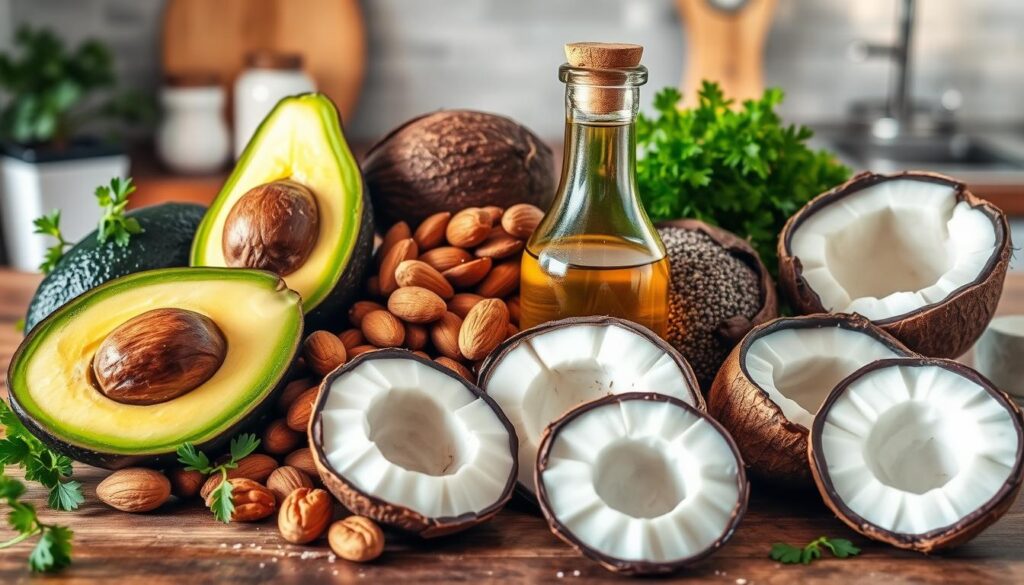
Hydration: The Overlooked Nutritional Aspect
Drinking enough water is key for muscle growth and health. It’s important to drink water before, during, and after working out. This helps move nutrients to muscles and gets rid of waste, making muscles less sore and improving how well you exercise.
Good hydration also gives you energy and helps with calorie tracking. It keeps blood pressure normal, helps heart rates stay steady during workouts, and reduces body stress. Also, when you’re preparing meals for muscle gain, don’t forget to focus on staying hydrated. It helps muscles grow and recover.

- Drink 17 to 20 fl oz of water two to three hours before exercise
- Drink 8 fl oz of fluid 20 to 30 minutes before exercise
- Drink 7 to 10 ounces of fluid every 10 to 20 minutes during exercise
Make hydration a priority in your meal prep for muscle gain and workout hydration routine. It supports muscle growth, boosts exercise performance, and improves your overall health.
| Hydration Level | Urine Color |
|---|---|
| Proper Hydration | Pale Yellow |
| Dehydration | Dark Yellow or Amber |
Supplements for Muscle Growth
Dietary supplements can help with muscle growth. A bodybuilding diet includes muscle-building foods and supplements. But remember, supplements should not replace a balanced diet and exercise.
Clean eating is key when using supplements. Eat whole, nutrient-rich foods first. Then, use supplements like protein powder, creatine, and BCAAs to help with muscle growth and recovery.
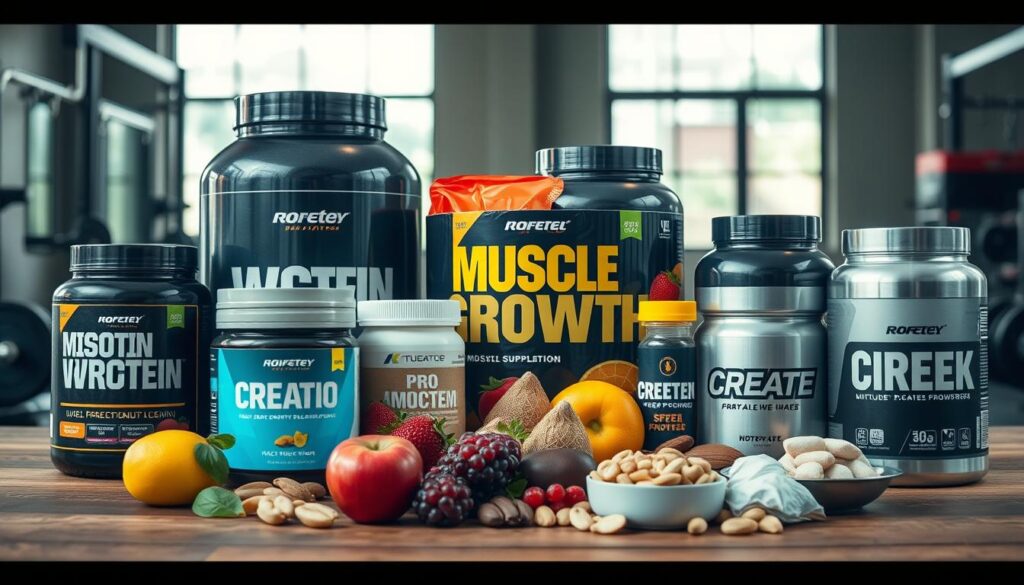
- Protein powder: Supports muscle repair and growth
- Creatine: Enhances muscle strength and endurance
- BCAAs: Critical for muscle growth and recovery
| Supplement | Recommended Dosage |
|---|---|
| Protein Powder | 0.6 to 0.9 grams per pound of body weight |
| Creatine | 20 grams daily for 5-7 days, followed by 3-5 grams daily |
| BCAAs | 10-14 grams daily |
Choosing the right supplements and knowing when to use them is crucial. Always think about your individual needs and goals. Also, talk to a healthcare professional before adding new supplements.
Meal Planning for Muscle Gain
Building muscle needs meal planning. It makes sure your body gets the right nutrients for muscle growth. A good meal plan keeps your energy levels up, even when you’re working out hard.
To grow muscles, you need to eat more calories than you burn. This helps with muscle repair and growth. For instance, a 175-pound male might eat 2,800 calories a day. This includes 175 grams of protein, 75 grams of fat, and 350 grams of carbs.
Here are some tips for effective meal planning:
- Calculate your daily calorie needs based on your weight and activity level.
- Balance your macronutrients: aim for 30-35% of calories from protein, 55-60% from carbs, and 15-20% from fat.
- Space out your meals to keep your energy levels consistent.

Remember, everyone’s nutritional needs are different. It’s key to make your meal plan fit your specific needs and goals. With the right meal planning, you can support your muscle gain journey and reach your fitness goals.
Common Mistakes in Muscle Nutrition
For muscle maintenance and gym recovery, a good diet is key. Many people make mistakes like skipping meals or not eating enough. They also ignore important nutrients and rely too much on supplements. To avoid these errors, focus on a balanced diet with nutrient-rich meals, protein shakes, and healthy snacks.
Protein is crucial for muscle growth and repair. Aim for 0.5 to 0.8 grams of protein per pound of body weight daily. Carbohydrates are also important, with endurance athletes needing more than strength-athletes. Healthy fats, like avocados and nuts, help with hormone production and muscle growth.
Some common mistakes to avoid in muscle nutrition include:
- Skiping meals or undereating, which can lead to muscle loss and decreased energy levels
- Ignoring micronutrients, such as vitamins and minerals, which can negatively impact muscle function and overall health
- Overemphasizing supplements, which can lead to an imbalanced diet and negatively impact muscle growth
To support muscle maintenance and gym recovery, avoid these mistakes. Focus on a balanced diet with nutrient-rich meals, protein shakes, and healthy snacks. Also, drink plenty of water to stay hydrated. With a well-planned diet and regular exercise, you can reach your muscle-building goals and stay healthy.
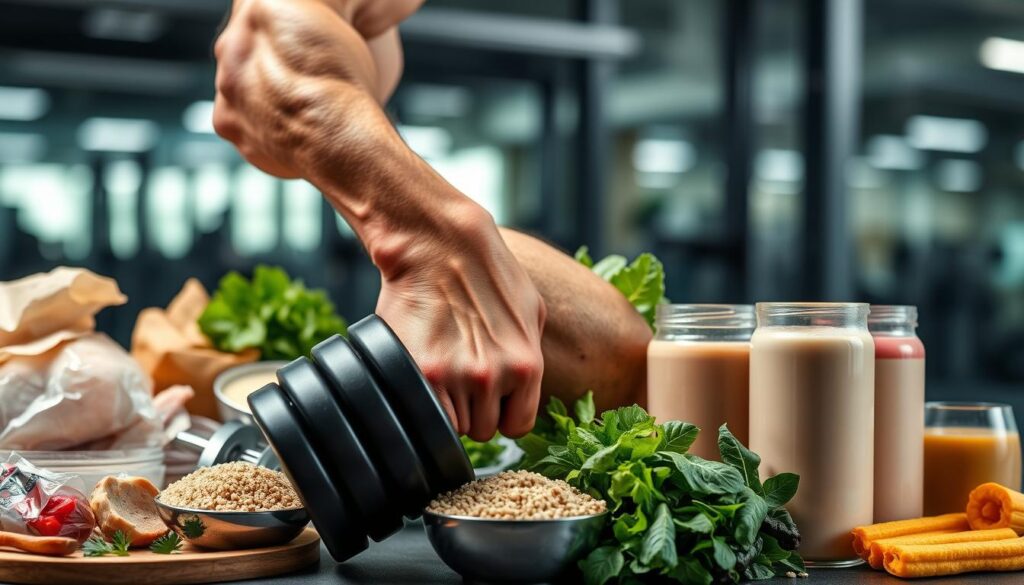
| Nutrient | Recommended Intake |
|---|---|
| Protein | 0.5-0.8 grams per pound of body weight per day |
| Carbohydrates | 3-7.5 grams per kilogram of body weight per day |
| Healthy Fats | 0.5-1.5 grams per kilogram of body weight per day |
Tracking Your Progress Towards Fitness Goals
Reaching your fitness goals is a journey that never ends. It’s important to track your progress to stay motivated. Start by setting goals that fit your needs and lifestyle.
Use tools like macro tracking apps or workout logs to keep an eye on your nutrition and exercise. This helps ensure your body gets the right nutrients for muscle growth and maintenance.
As you move forward, it’s okay to tweak your nutrition plan. Check your results often and make changes based on the data. Celebrate your small victories and remember, staying consistent is crucial for a healthier, stronger you.





















